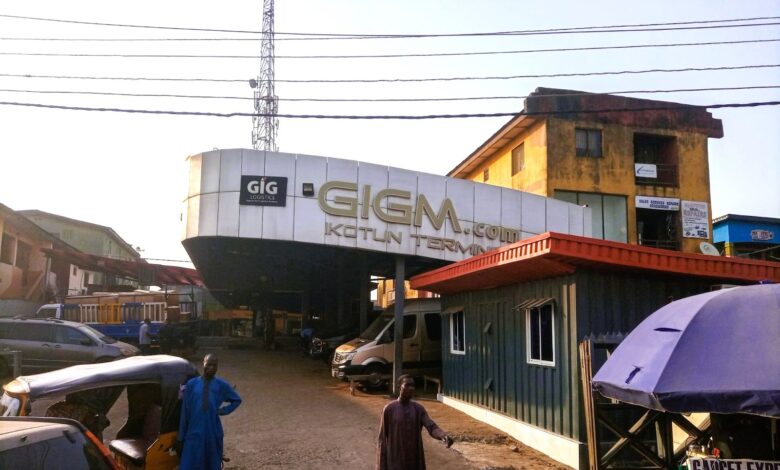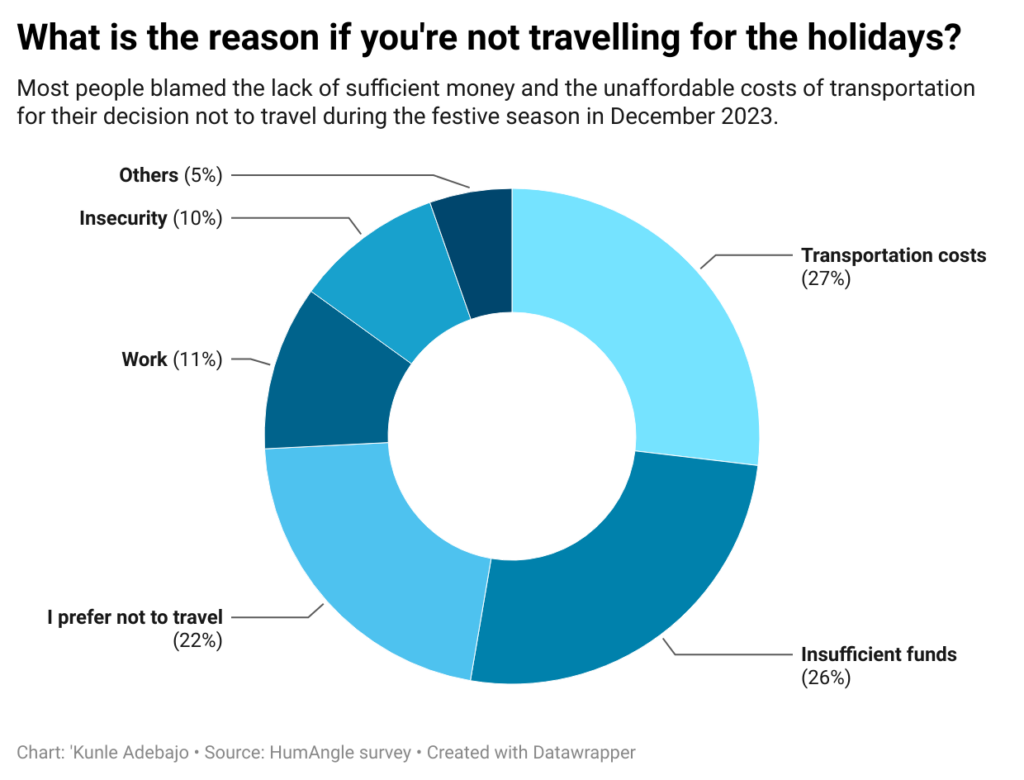Half Of Nigerians Not Travelling For Holidays Due To Lack Of Money, High Transport Costs
Some people cited security concerns as the reason they would not be travelling in a poll recently conducted by HumAngle. The survey also suggests that more people are spending time at work during the season than a decade ago.

Will you be spending the December holidays with your family? For many Nigerians, the answer to this question is no, and the reasons are not far-fetched.
Towards the end of every year, many Nigerians have developed a tradition of reuniting with their loved ones, especially after being away from them during the course of the year.
Aside from the fixed festivities, the period from mid-December through early January is known for diverse celebrations such as social gatherings, weddings, family reunions, cultural activities, and so on. It is the perfect time to hold such events because of the return of family members and kinsmen from other parts of the country or other countries. Many have even built houses in their hometowns, particularly set aside for end-of-the-year visits. However, over time, with the rising rate of insecurity and the declining standard of living, Nigerians are now wondering if they can afford to pay the price for the annual homecoming tradition.
Earlier this month, HumAngle conducted a survey where we asked Nigerians about their plans for the season.
The respondents were almost evenly divided between men (51 per cent) and women (49 per cent) and are from various parts of the country. Most of the respondents (84 per cent) are aged between 18 and 34 years, while the rest have ages ranging from 35 to 74. The demographic of the respondents is evenly distributed among different levels of monthly income: 38.5 per cent say they earn below ₦50,000, 36.9 per cent earn between ₦50,000 and ₦150,000, 10.6 per cent earn between ₦150,000 and ₦300,000, and 24 per cent earn above ₦300,000.
Fifty-eight (58) per cent responded that they do not live with their family or in their hometown most of the year — and this analysis will focus mainly on this section of the survey. Most of those who already live with their families replied that they plan to spend the holidays by staying at home and relaxing, attending a family reunion, or attending some other events. So, let’s try to understand the perspective of those who do not have this privilege.
Reasons like education, romantic relationships, job opportunities, and seeking a better quality of life have forced many to leave their family homes. Many people in this category (41.7 per cent) told us they see their families less than thrice a year, 13.3 per cent said almost never see their families, and another 41.7 per cent said they see them more than three times a year.
What are their plans for the holidays?
Most of them (30 per cent) will be staying at home to relax, 21.7 per cent weren’t certain, 20 per cent said they would be travelling, and 18.3 per cent said they would continue with their work.

Economic crisis, security concerns
From the chart above, we can see that only one in five respondents living away from their family will be travelling for the holidays and almost as many people would rather continue with their work. The majority will remain in their current location, and so many were undecided. Meanwhile, if there were no hindrances, as many as 83 per cent said they would rather spend their holidays with their loved ones in a different location.
We asked why.
Many said rising transportation costs and insufficient funds (27.8 per cent each) were the reasons. Some said they preferred not to travel (20.4 per cent) or had work to attend to (14.8 per cent), and a few blamed insecurity.
Surprisingly, nearly 80 per cent of the respondents living with their families also expressed a desire to travel during the holiday season. Those who would not be able to travel among them blamed the cost of transportation (33.3 per cent), insufficient funds (30 per cent), insecurity (23.3 per cent), and work (6.7 per cent).

Since the announcement of the removal of the fuel subsidy by Nigeria’s President Bola Tinubu at his inauguration ceremony in May, the price of fuel and everything else has gone up drastically, and by extension, the cost of living. HumAngle previously covered stories on how this crisis has affected Nigerians in different sectors, including market women, students, public transportation drivers, hospital patients, farmers, displaced people, youth corps members, and so on.
“I don’t imagine myself going anywhere in Nigeria without flying. If I am going to travel as far as Lagos or Ogun state, where I am from, I will always have to take a flight,” said Olympus Adebanjo, a resident of Abuja. “And flight in this period costs between ₦200,000 [$242] and ₦300,000 [$380]. That is high, compared to those days when you could fly to Lagos for ₦70,000 [$85].”
In 2019, God is Good Motors, a transportation company in Nigeria, charged between ₦5,500 and ₦12,800 for inter-state road travel. Four years later, in 2023, they now charge between ₦21,000 and ₦38,000 for the same destinations — which is, on average, a 222 per cent increase.
Insecurity is another factor to consider. Many Nigerians now avoid road travel because of the risks of getting abducted by armed groups who demand ransom. There are no rail networks connecting many parts of the country, and the alternative, travelling by air, is becoming less and less affordable.
Analysis by Beacon Consulting, a security consultancy firm based in Abuja, showed that the country recorded 7,472 security-related deaths between January and October this year, while 3,161 people were abducted.
Ofim Kelechi, a respondent to our survey who would have preferred to travel home for the holidays, says he has avoided the dangers of road trips by sticking to flights. “This period, however, I can’t afford to travel by air, and by what is circulating on social media, people are being kidnapped. I’m not confident enough to take that risk,” he explained.
Even Agape Ezema is guiding her decision through other peoples’ voyage experiences. “They kidnapped someone I know personally this time last year while he was travelling to Imo [a state in eastern Nigeria]. He was only released after payment of ₦5 million ransom was made.”
Because of Nigeria’s land mass, travelling by road between the North and South or other regions can take between six hours and a day. This gets more dangerous when the journey is embarked upon at night or when the vehicle breaks down along the way or reaches bumpy roads.
Akorede Oladipupo, who recently travelled to his hometown for the holiday, said that although his journey from Kogi to Oyo state was smooth, starting off the journey felt like taking a risk. He had fears and even second thoughts because of the terrible news about kidnapping that had been circulating around. “I just had to travel because it has been a while since I saw my family.”
Many robbers and kidnappers have been said to take advantage of the festive season when people travel to reunite with their loved ones to forcefully get money through ransom payment.
More than half of the people who filled out our survey said it’s been years since the last time they spent their December holidays in their preferred location.
Compared to 10 years ago
NOIPolls, a local polling and research organisation, conducted surveys between 2012 and 2014 to document how Nigerians were spending the festive period.
The 2014 poll showed that most Nigerians (86 per cent) thought where they would be spending their December break was peaceful and secure, an improvement compared to 54 and 77 per cent in 2012 and 2013, respectively.
The results also reflected an optimism about the economy that has likely dissipated since. Sixty-eight per cent of the respondents did not expect a general increase in prices during the festive season, down from 95 per cent in 2012. Also, only 2 per cent expected an increase in the price of fuel, 29 per cent expected a hike in transportation costs, and 52 per cent expected food to be more expensive.
Another insight from the poll is from the plans people had for their holidays. In 2013, only 2 per cent said they would continue with their business. The following year, this increased to 8 per cent. In HumAngle’s latest survey, however, up to 14.5 per cent said they would be engaged with work during the holidays, which likely reflects a desperation for survival in the face of steep inflation.
There is also a decline in the number of people hoping to travel during the festive period. NOIPolls recorded it to be 39 per cent in 2012, 32 per cent in 2013, and 29 per cent in 2014. In HumAngle’s survey, the number was 17.3 per cent, while 21.2 per cent of the respondents expressed uncertainty about their plans.
Support Our Journalism
There are millions of ordinary people affected by conflict in Africa whose stories are missing in the mainstream media. HumAngle is determined to tell those challenging and under-reported stories, hoping that the people impacted by these conflicts will find the safety and security they deserve.
To ensure that we continue to provide public service coverage, we have a small favour to ask you. We want you to be part of our journalistic endeavour by contributing a token to us.
Your donation will further promote a robust, free, and independent media.
Donate HereStay Closer To The Stories That Matter




